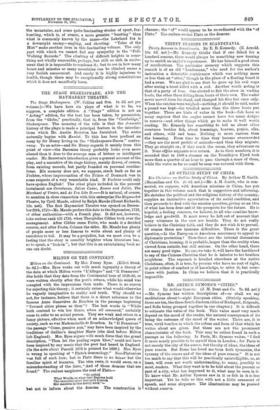MILTON ON THE CONTINENT.
Milton on the Continent. By Mrs. Fanny Byse. (Elliot Stock. 35. 6d.)—Mrs. Byse works out with much ingenuity a theory of the date at which Milton wrote "L'Allegro" and "Ii Penseroso." She holds that they date from the Continental tour of 1638-39, or were written shortly after the poet's return, while lais mind was occupied with the impressions then made. There is no reason for rejecting this theory ; it certainly raises what would otherwise be vaguely imaginative to reality and truth. Why should we not, for instance, believe that there is a direct reference to the famous Anne Genevieve de Bourbon in the passage beginning " Towned cities please us then" ? The last words in "While both contend to win her Grace, whom all commend," certainly seem to refer to an actual person. They are weak and otiose in a fancy picture, effective when used of an acknowledged queen of society, such as was Mademoiselle de Bourbon. In "U Penseroso " the passage "Come, pensive nun," may have been inspired by the traditions of Galileo's daughter Marie (she died before Milton left England). Mrs. Byse argues with much force that the grand description, "Then let the pealing organ blow," could not have been inspired by any music that the poet bad heard in England. (In the note about Purcell 1676 is printed for 1698.) Mrs. Byse is wrong in speaking of "Plato's demonology." Neo-Platonism was full of such lore ; but in Plato there is no brap.ow but the familiar spirit of Socrates. The idea rests, it would seem, on a misunderstanding of the lines, "And of those demons that are found." The recluse unspheres the soul of Plato— "To unfold What Worlds or what vast Regions hold 'The immortal mind that bath forso6k Her mansion in this fleshly nook "—
bit not to inform about the demons. The construction is
obscure; the " of " would appear to be cso-ordinated with the "of Plato." The recluse evokes Plato or the demons.


























































 Previous page
Previous page